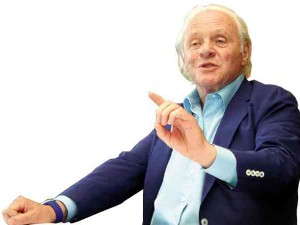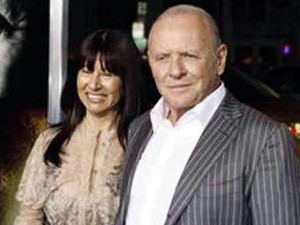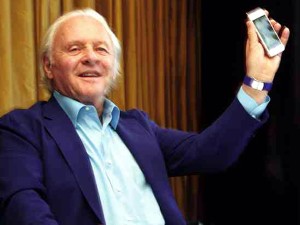Anthony Hopkins: He did more than okay
LOS ANGELES—The death of James Gandolfini several days earlier seemed to put Anthony Hopkins in an introspective mood during our interview. He brought up the subject himself: “I came back to the hotel the other night to the announcement that James Gandolfini was dead.”
Speaking in that familiar, calm, gentle voice, the silver-haired Welsh said, “I had never met James. We were in a film together, ‘All the King’s Men’ but we never actually met. He was a great actor. In an instant, pow! He’s gone. It’s over. You never know.”
Then, breaking into that benign smile he used to great effect in the “Hannibal” films, the 75-year-old thespian admitted, “I look at myself in the morning and go, ‘You are getting older, buddy.’ I think, that’s the way it is. It’s beginning to sag… and it’s perfect. Why worry about it, because we are all going to die?”
In that elegant intonation, Anthony spontaneously recited poetry lines from memory in this conversation at the Mandarin Oriental Hotel in New York. “There’s a wonderful poem (‘The Leaden Echo and the Golden Echo’) I like, by Gerard Manley Hopkins: ‘How to keep—is there any any, is there none such, nowhere known some, bow or brooch or braid or brace, lace, latch or catch or key to keep/ Back beauty, keep it, beauty, beauty, beauty… from vanishing away?/ O, is there no frowning of these wrinkles, ranked wrinkles deep/ Down? no waving off of these most mournful messengers, still messengers, sad and stealing messengers of grey?’”
Anthony could have recited the entire poem and we wouldn’t have minded because of his exquisite delivery, as delicious and memorable to hear as when his famously cannibal/doctor character dished that he had eaten liver “with some fava beans and a nice Chianti.” The actor’s blue eyes, through which his repressed butler in “The Remains of the Day” could express such longing, and through which we glimpsed the cold-blooded malevolence of Dr. Lecter, were alternately impish, twinkling, serious and piercing, depending on what was being discussed.
A wonderful life
“There’s a wonderful, eloquent feeling about it,” Anthony gushed about the poem on beauty and the ravages of time by the late English poet who shared his last name. “They are all dying, they are all going there. So you may as well have a laugh, like Woody Allen in ‘Hannah and Her Sisters’ when he gets to the end of the film… and he sees the Marx Brothers so he suddenly surmises and feels like, well, they are having fun—may as well have a laugh. There may be nothing after this. If there is, we might as well enjoy life, anyway.”
“I’ve had a wonderful life,” said the man who played US presidents Richard Nixon and John Quincy Adams, Pablo Picasso, Adolf Hitler and Alfred Hitchcock. “I’m happy to be alive. I would hate to be almost 76 and still working. I was asked, ‘Why do you take these parts? I said, ‘Well, it beats working.’ When I meet young actors and they say, ‘What is your advice?’ I say, ‘Keep working.’ ”
According to Anthony, his childhood in the small steel town of Port Talbot, Wales did not indicate at all that he would one day win an Oscar and be knighted by Queen Elizabeth II.
He recalled his student days: “I was terrible. I was pathetic. I sat in the back of the classroom my whole school life. I didn’t know what they were talking about. But it was a great gift because, in the end, I was so angry and enraged. Because of maybe dyslexia or ADD, or because I was a problem child, I was bottom of the class at everything. I was the only child. My father (Richard)—he wasn’t very encouraging—used to say, ‘Is there something radically wrong with this boy?’ My mom (Muriel) would say, ‘Leave him alone.’ ”
Anthony continued: “I think because I was so isolated and lonely as a kid, like most kids who are lonely, confused, bullied and all that, I think in a way I made a certain choice. I thought, I will get my revenge. I will become rich and famous.” With a soft chuckle, he added, “Of course, they are all dead now and I am still here. So there’s nobody around to revenge on. But it drove me to find a way of life that I thought would be beneficial to me.”
As he brought out his mobile phone, Anthony volunteered, “I had no clue over this but looking back at my fate or destiny or whatever you call it… I carry a photograph on my phone, of me as a 10-year-old boy and as a four-year-old and I look [look at them] and say, ‘We did okay, kid.’” His eyes lighting up, he held up his phone for us to see. “When I look at that photograph, to this day, I don’t know how I came into this business and why I am here. People say complimentary and negative things and I think, it’s all beyond me.”
With the quiet command of the fine actor that he is onscreen and the engaged interviewee that he is in person—a man who enjoys sharing anecdotes about the ironies and coincidences in his life—Anthony said, “I will tell you a brief story. My father had this shop in this little community in Taibach in Port Talbot. I was helping my father with the bakery. He was a baker. I remember it was 1955. I walked into this shop delivering bread and as I came out, a gray car pulled up to make a turn to the main road. In it was Richard Burton. He glanced at me, and I glanced at him, and I thought, I want to be like that.
Synchronistic moment
“About some months later, I went to his house and asked for his autograph. He signed the autograph, made some comments and said, ‘Do you speak Welsh?’ I said no. He said, ‘You are not a true Welshman.’ He gave me a wink. As I walked down the hill, his car passed by. It was a Jaguar. He was with Sybil (Williams), his first wife. She waved. I thought, one day I want to be there.”
Visibly enthused by this story, Anthony continued, “Years later, I was in New York doing a play, ‘Equus,’ at the Plymouth Theater. At the end of the day, there was a knock on the door. The manager brought Sybil Burton, with Christopher Plummer and Lauren Bacall, into my room. I thought, what the hell is this all about? It was a synchronistic moment. A year later, I went to the same theater to visit Richard Burton in the same play. Now, I can’t figure that out. That doesn’t make any sense at all but it was a kind of matrix, or the synchronicity that we all are connected by.”
Anthony obviously couldn’t get over the irony that Richard, the man who inspired him to be an actor, took over the role, Dr. Dysart, that he (Anthony) first played.
“I could have ended up in the steelworks in Port Talbot,” quietly declared one of the world’s greatest living actors. “I had no future. One night, I just stumbled into the YMCA, where I got a part in a small amateur group. Then an advert appeared in a paper for a scholarship to the local college of music and drama. I tried for the scholarship and I won it against all odds. That was how I started, in 1955. Then the years went by and I went to the Royal Academy (of Dramatic Art) in London. I went straight to work in Leicester (Haymarket) Theater, a provincial theater, about 50 years ago. God almighty, I can’t believe it’s gone that fast.”
He added, “I remember all that stuff. I remember being in that theater when (John F.) Kennedy was assassinated. I remember being with Laurence Olivier in the National Theater. I was restless and I left. I did ‘The Lion in Winter’ and from there, I got out to Hollywood. That’s been the journey of my life.”
“The Lion…” marked his break in film, and cinema has been richer since then with his performances.
“I sometimes teach at UCLA,” he volunteered. “I haven’t done it for about five years but sometimes I do and I say to the young acting students, ‘Don’t take it too seriously. If you stopped acting today, nobody would give a damn. The world would go on.’ And the great James Gandolfini is suddenly gone—that’s sad. So it makes you want to enjoy it all while you can.”
Once noted for his excessive drinking, suffering blackouts (he woke up in a Phoenix, Arizona hotel once with no recollection of how he ended up there), Anthony pointed out, “We have choices to make on the way we live. We can control our behavior, choose to have a certain outlook. I remember when I drank like a fish and smoked my lungs out. In Wales, there was this man at the pub that I used to go to. He was very clean-living. He smoked one cigarette a week, drank one glass of beer a week. And he dropped dead, just like that, of brain hemorrhage. My father said to me—he and I used to drink heavily—‘Well, there you go—he didn’t drink, didn’t smoke, dropped dead, bam! We’ve been facing this a long time. Drink up, be merry.’”
Choices made
He went on: “But you have a certain choice. You come to a certain age. You think, ‘It’s not too smart to feed the fuel tank with all this junk so I better slow down or stop.’ So some years ago, I had a choice—live or die. Grow or go. I said, I better make some choices here. I stopped doing certain things, started behaving in a certain way.” Sober for almost 40 years now, he is a lifelong member of Alcoholics Anonymous.
Smiling as he talked about Stella Arroyave, his third wife, the man who also used to be known for his temper credited her for “slowing” him down: “I am married to a wonderful woman who slows me down. She’s many years younger than me. She looks after me and says, ‘Slow down.’ It’s my nature to do things fast because I’ve convinced myself that I am only 45. I walk like a 45-year-old. I have fallen. I have tripped. Last year, I was in Austria doing a concert and I slipped and broke my ankle. I was walking too fast. So I have to control my behavior.”
He was in an Austrian concert because, yes, the man is also a classical music composer. And he paints and draws. Eyes closed, Anthony began doodling on a piece of paper in front of him. Finishing with dramatic flourish by raising a hand and opening his eyes, Anthony beamed, showed us his impromptu creation and mischievously exclaimed, “Picasso!”
Not hard work
This multitasking septuagenarian said he couldn’t wait to go back to Atlanta, Georgia where he was filming the thriller, “Solace,” with Colin Farrell and Jeffrey Dean Morgan. “Working keeps me off the streets,” Anthony quipped. “It keeps me out of trouble. I love the process of studying the script over and over. That’s not hard work; that just keeps my brain synapses going.” Laughing, he remarked, “And ward off old-age problems, I hope. I love the challenge of learning lines and scripts. I learn something. And I enjoy putting on some clothes, having some make-up dabbed on me and then I go on and do some acting.”
He can certainly learn his lines. The poem he recited was part of a regimen to maintain his good memory. The actor reportedly stunned his “Amistad” director, Steven Spielberg, and crew when he delivered a seven-page courtroom speech in one go.
Anthony still loves to be on sets (but not Hollywood’s social scene). Grinning again, he said, “People say, ‘Doesn’t it get boring hanging around?’ I say, ‘Well, that’s what they pay me to do.’ Sometimes you have three hours on the set—maybe all day—and you don’t do anything. But I love it. I like meeting people on the set—other actors, the director and the crew. That sure does beat work.”
As our chat wound down, he professed, “I am happy, whatever that means. Living in Malibu is nice. I stay well away from the movie industry. I know it’s my life because I play the piano, I read and take walks on the beach, sometimes with my wife. Then they call me for work.”
Title for his memoir
“And I am not going anywhere,” he said. “None of us are going anywhere so I have given up racing somewhere. None of us are getting off this planet alive. So I don’t watch the news. I don’t want to know because it’s all negativity to get us on the edge and keep us worried. What’s going to happen is going to happen. I have no control. I am just fortunate to still be in this business.”
He revealed that if he ever got to sit still one day and write his memoir, he already had a title: “We Did Okay, Kid.” He survived it all: “We’ve all had problems. I had my bout with the booze and it nearly damned kill me.” Laughing yet again, he dished, “I have had marriages and setbacks. C’est la vie.”
“I just feel that this is like a dream,” he said. “I showed you that photograph of me as a little kid. Yes, I look at that and think, we did okay, fella. And there I am, sitting next to Bruce Willis (his “Red 2” costar), or traveling around the world and doing my thing. They’ve put my star on the Hollywood Walk of Fame. I got my footprints in Grauman’s Chinese Theater. That was impossible, but it happened. I don’t understand any of it.”
Indeed, the bewildered school kid at the back of the classroom grew up to be more than okay. At 75, he’s at the top of his class.
(E-mail the columnist at [email protected]. Follow him at https://twitter.com/nepalesruben.)

















